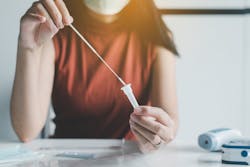Johns Hopkins Medicine-led study shows rapid COVID-19 tests done at home are reliable
In a study involving nearly 1,000 patients seen at the Baltimore Convention Center Field Hospital (BCCFH) during a five-month period in 2022 — researchers at Johns Hopkins Medicine, the University of Maryland School of Medicine and five other collaborators report that a rapid antigen test (RAT) for detecting SARS-CoV-2, the virus that causes COVID-19, can be used at home with accuracy comparable to the same test being administered by a healthcare professional.
The study was first posted online February 13, 2024, in the American Society for Microbiology journal Microbiology Spectrum.
The researchers say their findings show that self-administered RATs rivaled the clinician-administered tests in both sensitivity (the ability, according to the National Institutes of Health (NIH), to provide a positive result for a person infected with SARS-CoV-2) and specificity (the ability, also according to NIH, to yield a negative result for a person not infected with the virus).
They added that both the self-administered and clinician-administered rapid tests evaluated in the study were comparable to the sensitivity and specificity of the established standard test for COVID-19 — the polymerase chain reaction (PCR) assay.
“We found the results between the self- and clinician-administered rapid tests were statistically similar in sensitivity — 83.9% to 88.2%, respectively — and specificity — 99.8% to 99.6%, respectively,” says study senior author Zishan Siddiqui, M.D., assistant professor of medicine at the Johns Hopkins University School of Medicine.
For their study, the researchers enrolled 953 adult patients being seen at the BCCFH during the period of Feb. 12 to July 15, 2022. The study group was 60.6% female, 58.6% white, and 98.2% English-speaking. The median age was 34.
Participants reporting at least one COVID-19 symptom were categorized as symptomatic, while those reporting no symptoms were marked asymptomatic. Attending staff conducted both rapid antigen and PCR tests on the participants, and then had them independently perform a RAT. The patients were asked to report their own results, which the researchers re-read and assessed.

